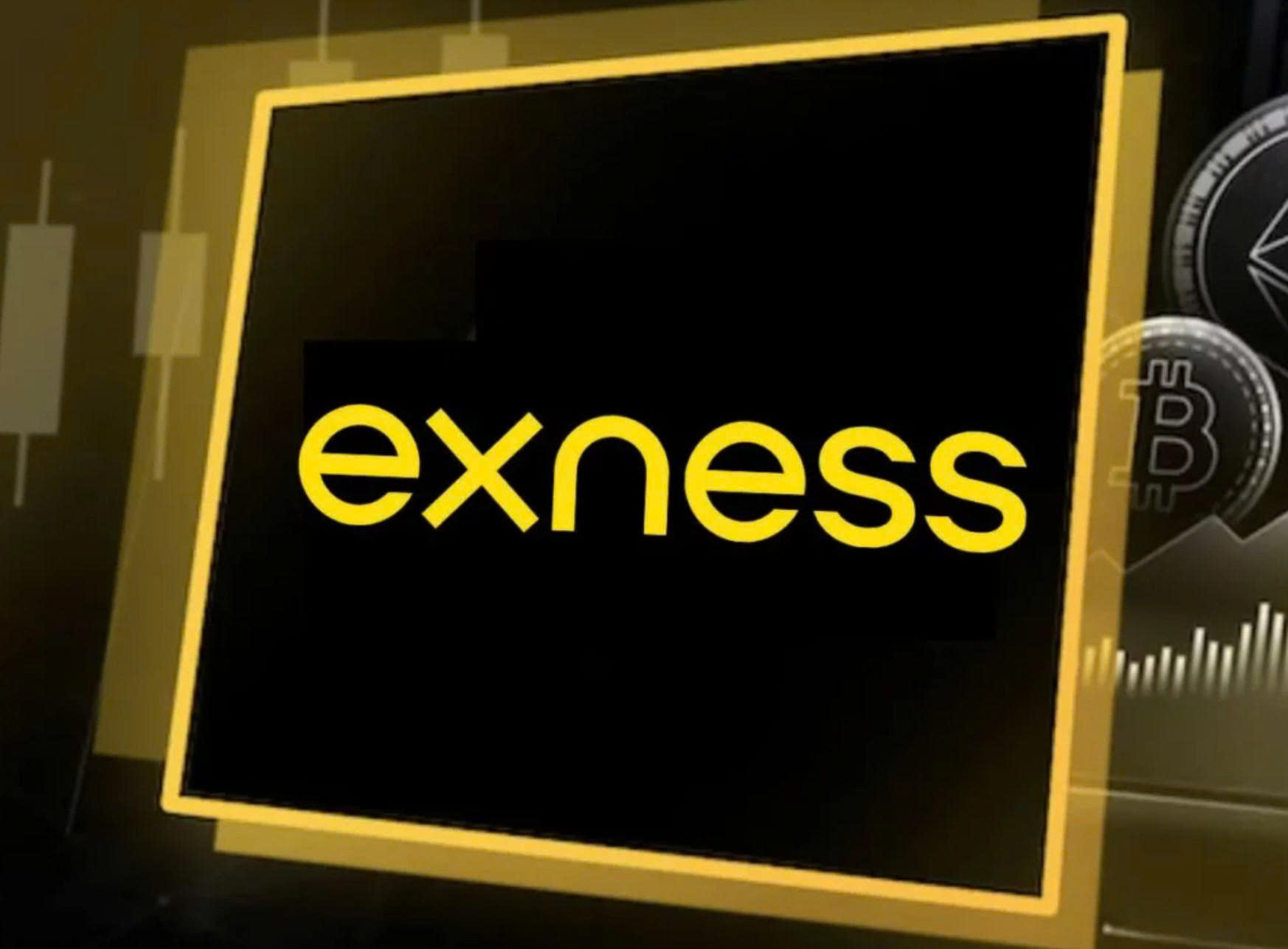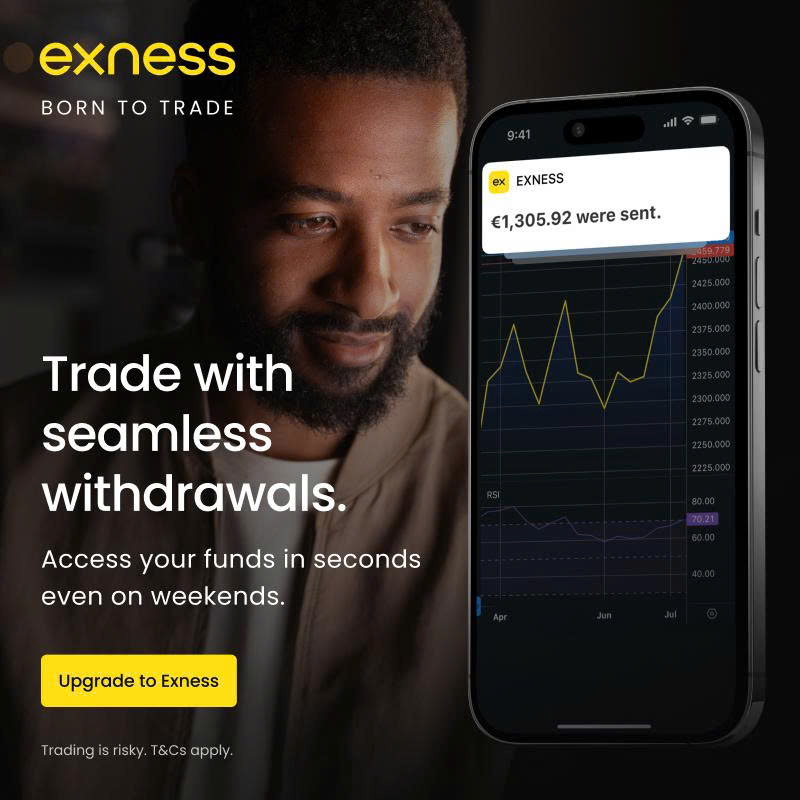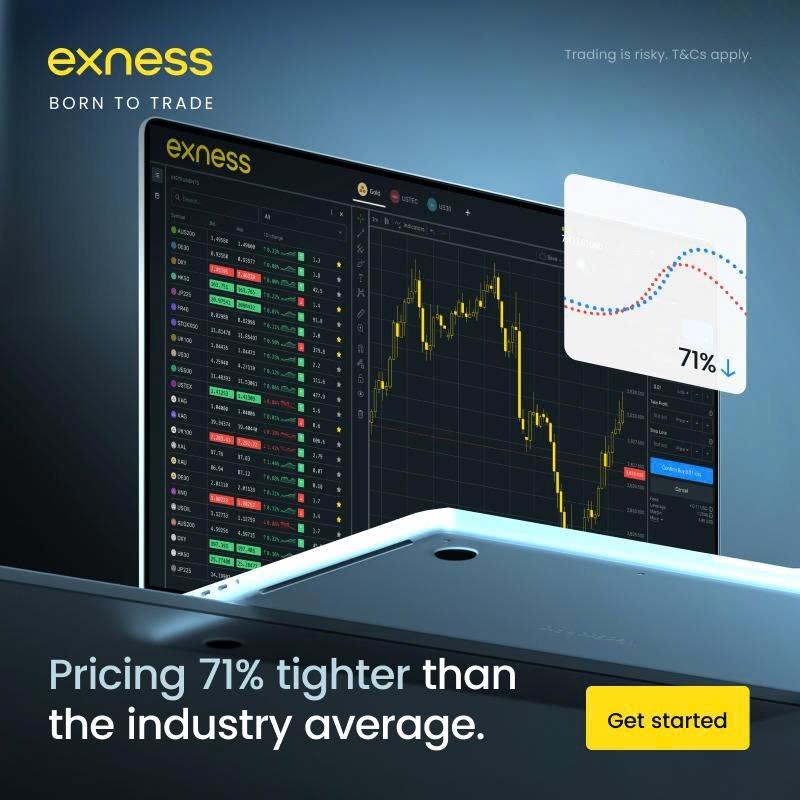
8 minute read
Which Exness Account Is Best for Scalping? A Comprehensive Review
If you’re a forex trader looking to dive into the fast-paced world of scalping, you’ve probably heard of Exness. Scalping, with its quick trades and small profit targets, demands a broker with tight spreads, fast execution, and low costs. So, which Exness account is best for scalping? The short answer: the Raw Spread vs Zero accounts are your top picks for scalping due to their ultra-low spreads and fast market execution. But let’s break it down to help you choose the perfect account for your scalping strategy, while also exploring why Exness is a solid choice for this high-frequency trading style.

✅ Trade with Exness now: Open An Account or Visit Brokers 👈
In this article, we’ll walk you through scalping, dive into Exness’s account types, compare their features for scalping, and give you practical tips to maximize your trading. Whether you’re a beginner or a seasoned scalper, this guide will help you make an informed decision.
What Is Scalping, and Why Does Your Account Choice Matter?
Scalping is a trading strategy where you aim to profit from tiny price movements, often holding trades for just seconds or minutes. Think of it as making dozens (or even hundreds) of trades a day, each targeting a few pips of profit. To succeed, you need a broker that supports:
Low spreads: Every pip counts when you’re scalping, so tight spreads are non-negotiable.
Fast execution: Even a split-second delay can lead to slippage, costing you profits.
Low commissions: High fees can eat into your small profit margins.
Reliable platform: You need a platform like MetaTrader 4 (MT4) or MetaTrader 5 (MT5) that’s stable and fast.
Exness, a globally recognized broker founded in 2008, is a favorite among scalpers for its competitive conditions, multiple account types, and robust trading platforms. But with five account types—Standard, Standard Cent, Pro, Raw Spread, and Zero—how do you know which one suits scalping best? Let’s dive into the details.
Exness Account Types: A Quick Overview
Exness offers five main account types, each tailored to different trading styles. Here’s a snapshot of what they offer, with a focus on their suitability for scalping:
Standard Account: Designed for beginners, this account has no commissions and spreads starting from 0.3 pips. It’s user-friendly but not ideal for aggressive scalping due to wider spreads.
Standard Cent Account: Perfect for micro-trading with a low minimum deposit ($1), but it’s limited to forex and metals, and spreads are similar to the Standard account.
Pro Account: Aimed at experienced traders, it offers instant execution, spreads from 0.1 pips, and no commissions, making it a decent option for scalping.
Raw Spread Account: Built for high-frequency traders, this account features spreads from 0.0 pips with a fixed commission of up to $3.50 per lot per side.
Zero Account: Offers zero spreads on major instruments 95% of the time, with commissions starting from $0.2 per lot per side, ideal for scalpers who prioritize minimal costs.
For scalping, the Raw Spread vsZero accounts stand out because of their ultra-tight spreads and fast execution. But let’s compare them head-to-head to see which one is the best fit for you.

✅ Trade with Exness now: Open An Account or Visit Brokers 👈
Raw Spread vs Zero Account: The Scalper’s Choice
When it comes to scalping, the Raw Spread and Zero accounts are the clear frontrunners. Here’s a detailed comparison to help you decide:
Raw Spread Account
Spreads: Start from 0.0 pips on major currency pairs, but they can vary slightly depending on market conditions.
Commissions: Fixed at up to $3.50 per lot per side, which is transparent and predictable.
Execution: Market execution with no requotes, ensuring your trades are filled at the best available price.
Minimum Deposit: $200, which is affordable for most serious scalpers.
Instruments: Access to over 200 instruments, including forex, metals, cryptocurrencies, indices, and stocks.
Why It’s Great for Scalping: The ultra-low spreads and reliable execution make this account perfect for scalpers who trade frequently and want to keep costs low. It’s also versatile, supporting other strategies like day trading or automated trading.
Zero Account
Spreads: Zero spreads on the top 30 instruments (like major forex pairs) 95% of the time, with minimal spreads on other instruments.
Commissions: Start from $0.2 per lot per side, but can vary based on trading volume and instrument.
Execution: Market execution with no requotes, ideal for fast-paced scalping.
Minimum Deposit: $200, similar to the Raw Spread account.
Instruments: Same broad range as the Raw Spread account, giving you plenty of options.
Why It’s Great for Scalping: The zero-spread feature is a game-changer for scalpers, as it eliminates spread costs on major pairs, leaving only the commission to worry about. This can lead to significant savings for high-volume traders.
Which One Wins?
Choose the Raw Spread Account if you want predictable commissions and trade a wide variety of instruments. It’s slightly more cost-effective for traders who don’t focus solely on major forex pairs.
Choose the Zero Account if you primarily scalp major currency pairs (like EUR/USD or GBP/USD) and want the lowest possible spread costs. The variable commission structure can be a bit higher for some instruments, so calculate your costs based on your trading habits.
Both accounts are excellent for scalping, but the Zero account edges out slightly for traders who stick to major pairs due to its spread-free trading.
Why the Pro Account Might Work for Scalping
While the Raw Spread and Zero accounts are the go-to choices, the Pro Account deserves a mention for scalpers who prefer instant execution. Here’s why:
Spreads: Start from 0.1 pips, which is tighter than the Standard account but not as low as Raw Spread or Zero.
Commissions: None, which is a big plus for keeping costs down.
Execution: Instant execution, which guarantees your trade is filled at the quoted price (though it may come with occasional requotes in volatile markets).
Minimum Deposit: $200, same as the professional accounts.
Why It’s Good for Scalping: The lack of commissions and tight spreads make it a viable option for scalpers who prioritize simplicity and don’t mind slightly higher spreads compared to the Raw Spread or Zero accounts.
However, instant execution can be a double-edged sword. In fast-moving markets, requotes can disrupt your strategy, making the Pro account less ideal than the Raw Spread or Zero accounts for aggressive scalping.
Why Exness Is a Scalper’s Dream
Exness isn’t just about account types—it’s built a reputation as a scalper-friendly broker. Here’s why:
Fast Execution Speeds: Exness uses advanced technology to ensure low-latency execution, critical for scalping where every millisecond counts.
Low Trading Costs: With spreads as low as 0.0 pips and competitive commissions, Exness keeps your costs minimal, maximizing your profit margins.
Wide Range of Instruments: You can scalp forex, metals, cryptocurrencies, indices, and more, giving you flexibility to diversify your trades.
High Leverage: Exness offers leverage up to 1:2000 (depending on regulation and account verification), allowing scalpers to maximize their positions with smaller capital.
Robust Platforms: Both MT4 and MT5 are available, with support for automated trading (Expert Advisors) and advanced technical analysis tools.
Swap-Free Options: For Muslim traders, Exness offers Islamic accounts with no overnight fees, which is great for scalpers who occasionally hold trades longer.
24/7 Support: Scalping is a high-stress strategy, and Exness’s round-the-clock customer support ensures you’re never stuck.
Practical Tips for Scalping with Exness
To make the most of your scalping strategy on Exness, here are some actionable tips:
Test with a Demo Account: Exness offers demo accounts for all account types (except Standard Cent). Practice your scalping strategy risk-free to see which account suits you best.
Focus on Major Pairs: Major currency pairs like EUR/USD and GBP/USD have the tightest spreads and highest liquidity, making them ideal for scalping.
Monitor Trading Costs: Calculate whether the Zero account’s variable commissions or the Raw Spread’s fixed commissions are more cost-effective for your trading volume.
Use MT4/MT5 Tools: Leverage technical indicators, one-click trading, and Expert Advisors to execute trades quickly and efficiently.
Trade During High Liquidity: Scalping works best during volatile sessions like the London or New York overlap, when spreads are tightest.
Manage Risk: Scalping involves high-frequency trading, so use stop-loss orders and keep your leverage in check to avoid big losses.
Who Should Choose Which Account?
Beginner Scalpers: Start with the Pro Account to avoid commissions and get a feel for scalping. Once you’re confident, upgrade to the Raw Spread or Zero account.
Experienced Scalpers: Go for the Raw Spread Account for predictable costs or the Zero Account if you trade major pairs and want zero spreads.
High-Volume Scalpers: The Zero Account is your best bet for minimizing spread costs, especially if you trade large volumes on major pairs.
Final Thoughts: Pick Your Scalping Powerhouse
So, which Exness account is best for scalping? For most scalpers, the Raw Spread and Zero accounts are the clear winners, offering ultra-low spreads, fast execution, and transparent pricing. If you trade major forex pairs and want to eliminate spread costs, the Zero account is your top choice. For versatility across various instruments, the Raw Spread account is hard to beat. If you’re just starting out or prefer commission-free trading, the Pro account is a solid alternative, though it may not match the precision of the other two.
Exness’s combination of low costs, fast execution, and a reliable platform makes it a go-to broker for scalpers. Before diving in, test your strategy with a demo account, calculate your trading costs, and choose the account that aligns with your goals.
✅ Trade with Exness now: Open An Account or Visit Brokers 👈
Read more:

